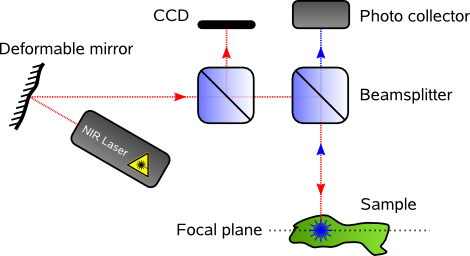Smart Optics Systems programme (Funding: STW Perspectief)
Smart Microscopy of Biological Tissues
| Applicants: | Prof. Hans Gerritsen (Utrecht
University, project
leader) Prof. Christoph Keller (Utrecht University) Prof. Michel Verhaegen (TU Delft) |
| Partners: | Dr. Maarten Balzar (Nikon) Dr. Niek Doelman (TNO) Dr. Gleb Vdovin (Flexible Optical) Dr. Gert 't Hooft (Philips Biomedical Photonics Department) Dr. Marc v. Zandvoort (Univ. Maastricht) Dr. H.J.C.M. Sterenborg (Erasmus MC) |
| Researchers: | Tim van Werkhoven (Utrecht) Jacopo Antonello (Delft) Dr. Hoa Truong (Utrecht) |
| Publications: | |
|

Adaptive Optics for Two Photon Microscopy.
| |
| Project outline: |
Microscopy has become increasingly more important in biological and biomedical work. This is to a great extent due to the development of advanced imaging methods such as confocal microscopy and multi-photon excitation microscopy that provide 3-D imaging in (optically thick) specimens. At present, multi-photon excitation microscopy is the technique of choice for high-resolution in-vivo imaging. Unfortunately, the use of these techniques is seriously hampered by specimen-induced aberrations that result in reduced depth penetration, loss of spatial resolution, and increased phototoxicity. Current implementations of adaptive optics (AO) provide evidence that AO can significantly improve image quality, depth penetration, and spatial resolution while reducing phototoxicity in scanning microscopy. However, severe speed limitations render them impractical for real-life applications. Here, we will focus on the development of fast, active compensation methods for specimen-induced wavefront aberrations. High compensation speeds will be realized by using adaptive optics in combination with smart predictive algorithms that take into account all system properties including the scanning nature of the acquisition, the dynamic properties of the deformable mirror based AO and the nature of the optical optimization. To realize the above, academic experts in the area of advanced microscopy (Molecular Biophysics group), adaptive optics (Experimental Astrophysics group) and advanced control systems (Delft Center for Systems and Control) will closely collaborate. The team is further strengthened by the involvement of relevant industrial partners. The method will be validated in tissue imaging experiments including in-vivo imaging of skin, in-vivo tumour mouse models and isolated arteries. The latter part of the project will be carried out in collaboration with (bio)medical groups. |